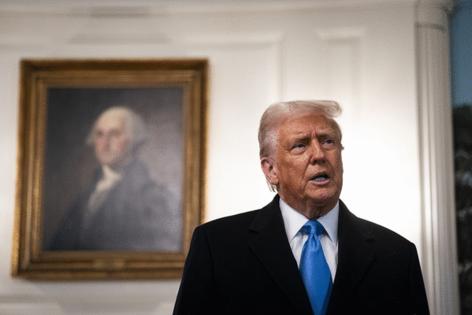John M. Crisp: Trump reshapes history while we're not looking
Published in Op Eds
Some of President Donald Trump’s ill-advised actions would be more shocking if there weren’t so many of them. But how much consternation can you expend over Trump’s firing of the commissioner of the Bureau of Labor Statistics because he didn’t like the labor statistics, while, shortly thereafter, he mobilizes the National Guard and takes over Washington, D.C.’s, police department?
Comparatively minor outrages pass with little notice.
Let’s consider a couple:
First: In June Trump restored the names of seven army installations that had been previously named to honor Confederate officers such as Robert E. Lee and Braxton Bragg.
In 2021, in a rare stroke of bipartisan enlightenment, Congress created The Naming Commission, which was charged with renaming these installations after Americans who never took up arms against our nation in order to preserve slavery. Thus Fort Bragg became Fort Liberty and Fort Lee became Fort Gregg-Adams, named for Lt. Gen. Arthur Gregg, the first Black three-star general, and Lt. Col. Charity Adams Earley, the highest ranking Black female officer in World War II.
Not anymore. Fort Lee and Fort Bragg will continue to commemorate the traitors and defenders of slavery after whom they were originally named.
The Department of Defense stayed within the letter of the law by invoking a different non-traitorous Lee and a different non-slaveholding Bragg and claiming to name the forts after them instead of Robert E. and Braxton.
Don’t be misled by the cynical, wink-winking sleight-of-hand. Everyone knows what’s going on.
Second: Something remarkable happened last week. It would be even more remarkable if it didn’t so easily fade into the background of other remarkable actions by the Trump administration. In short, the administration took control of our national museums.
In a letter to Lonnie Bunch, secretary of the Smithsonian Institute, the White House announced that it will be reviewing all museum exhibitions, present and future, including wall text, websites and all other materials, “to assess tone, historical framing and alignment with American ideals.”
The level of intrusion into the functions of the Smithsonian Institute is extraordinary. The upshot is that its museums must, within 120 days, complete the task of “replacing divisive or ideologically driven language with unifying, historically accurate and constructive descriptions.”
This is an amazing amount of power to place in the hands of one person: Trump.
It has an ominous authoritarian vibe. In fact, would-be authoritarians nearly always attempt to take control of their country’s cultural heritage and to shape a national narrative that is often at odds with historical accuracy and transparency. Hungary’s Victor Orban is an excellent example.
The Trump administration plans to start with eight museums. Not surprisingly, the National Museum of African American History and Culture is on the list.
I visited this museum last year. It starts, of course, with the brutal realities of the slave trade and leads through plantation life, emancipation, reconstruction, Jim Crow, lynching and the civil rights struggles of the 60s. I wonder how this story meshes with Trump’s “directive to celebrate American exceptionalism” and “remove divisive or partisan narratives.”
On the other hand, the museum also celebrates the remarkable contributions that Blacks have made to American life. It’s not just jazz and football. In fact, America would not be America without Black people. I came away thinking: If I were Black, this museum would make me proud.
But, as a white man, the museum made me proud, as well: I’m glad I live in a country that has the courage and self-confidence to confront honestly its own history.
Of course, authoritarians don’t like for their countries to be honest, courageous and self-confident. Their appeals to nationalism and self-righteous exceptionalism are powerful tools; they’re nearly always part of the authoritarian playbook.
It remains to be seen what sort of spin Trump will impose on the less-savory elements of our racial history, but it should concern us that one man is taking control of that narrative. Especially since—by renaming the army posts—he’s already revealed his admiration for the glories of the old Confederacy.
_____
_____
©2025 Tribune Content Agency, LLC
























































Comments